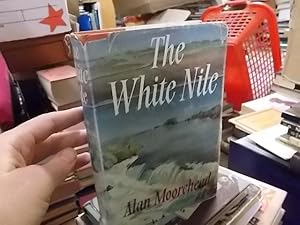

Nearly a third of the book's devoted to Urabi Pasha's nationalist rising in Egypt and the Mahdist Wars of the 1880s, where a fanatical Muslim sect conquered the Sudan and threatened British interests in North Africa. Livingstone and his rescuer Henry Morton Stanley the eccentric governor Emin Pasha, a German convert to Islam who found himself subjected to a costly rescue mission he neither wanted nor needed. There's Richard Burton, the vulgar, larger-than-life sensualist who gained fame as much for his translations of erotica as his death-defying adventures in Africa and Arabia John Hanning Speke, his humorless partner-turned-rival in searching for the Nile's source Sir Samuel Baker, who traversed modern Uganda with his wife Florence, whom he rescued from a Turkish slave market the famous Dr.

Moorehead's book provides colorful portraits of the era's outsize explorers and soldiers, mostly British, many eccentric and all recklessly brave, obtaining the kind of celebrity later generations accorded rock stars and astronauts. Their success was spotty, but still significant given how entrenched the practice was.Īlan Moorehead's The White Nile is a lively, entertaining, occasionally dated narrative of the European exploration of Central Africa in the late 19th Century. Breaking the practice of slavery involved a complex mix of Christian missionaries, war, famine, and the deliberate actions of a number of the explorers listed above. The slave trade was quite healthy in central Africa, and was wrapped up in the lifestyle of the Moslem populace. Lots of slaves, which is really what this book is about. Pygmies, cannibals, poison darts, jungle battles, quicksand, malaria, a murderous native chief who walks on his toes so he can imitate a lion, and slaves. Moorehead wraps all of this in some wonderfully descriptive prose that sounds, at times, like scenes from a Tarzan movie. What a crew! Richard Burton, who comes across as highly competitive, and a bit sinister John Speke, who would find the source of the Nile, but who would also die tragically (arguably, a suicide) on the eve of a debate with his foe, Burton the saintly Livingstone the soldier journalist (and rescuer), Stanley the determined and charismatic Mahdi, and, of course, Gordon, a Christian mystic, a soldier, a hero, and, to some, a madman. And that's rather amazing when you consider Moorhead's book is crammed with a real League of Extraordinary Gentlemen (and at least one remarkable woman: Lady Florence Baker).

After that, the figure of General Charles "Chinese" Gordon, and the siege of Khartoum dominates the book. Just outstanding, though I think the "White Nile" part of the story fades quickly after the first 75 pages or so. "I am here, like iron." -Major-General Charles "Chinese" Gordon


 0 kommentar(er)
0 kommentar(er)
